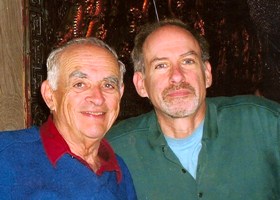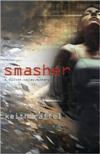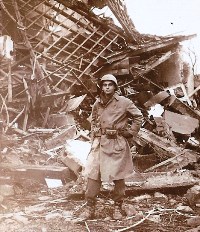Jerome Raffel loved to read about his War, which was World War II. For years his son, thriller writer Keith Raffel did not understand this passion. Then he came to realize why these books mattered to his father. And in his own writing --- and reading --- he sees why we love to explore the world we already know a lot about. Pictured below: Jerome Raffel in Rilchingen, Germany in 1945.
 When I turned 20, I was in college, studying, protesting and hanging out. When my father turned 20, he was near the French-German border a mile behind the front lines using a surveyor’s transit to help pinpoint the location of enemy artillery.
When I turned 20, I was in college, studying, protesting and hanging out. When my father turned 20, he was near the French-German border a mile behind the front lines using a surveyor’s transit to help pinpoint the location of enemy artillery.
Toward the end of the War in the spring of 1945, Dad didn’t really have a job anymore. There were no defined front lines, because the German army was in fast retreat. So, he and some pals mounted a machine gun on the back of a jeep and took off to “see the war” while bullets were still flying. Isn’t that just the kind of crazy thing 20-year-olds would do? They stumbled upon a hidden cache of French wine. They were there when Hermann Goering, Hitler’s deputy, was captured and there again on the day Dachau was liberated.

Into my early 20s, for Hanukkah, his birthday and Father’s Day, I’d give Dad tennis togs he’d throw into the back of the closet or barbeque paraphernalia he’d use for one summer season before discarding them. Then I got wise. For 30 years I gave him books instead. He’d read thrillers, but what he really loved were books about the War. Any corporal, captain, or colonel who wrote a book about his experiences in the European Theater of Operations had an enthusiastic reader in Dad.
 Fortunately, given the millions of army veterans who’d served over there, the supply of memoirs was steady. Dad would also read biographies of the leading players like George Patton or Omar Bradley and histories about the Normandy landings, Monte Cassino, Anzio, the Battle of the Bulge, and countless other campaigns. Novels set against the background of the War in Europe would meet his approval, too. He disdained books about the Navy’s War or the War in the Pacific. They weren’t his War. The World War II books I gave Dad never went to the back of a closet; instead, once read, they were displayed in his home office on shelves at first sparsely populated, but later dipping in the middle under the weight they bore.
Fortunately, given the millions of army veterans who’d served over there, the supply of memoirs was steady. Dad would also read biographies of the leading players like George Patton or Omar Bradley and histories about the Normandy landings, Monte Cassino, Anzio, the Battle of the Bulge, and countless other campaigns. Novels set against the background of the War in Europe would meet his approval, too. He disdained books about the Navy’s War or the War in the Pacific. They weren’t his War. The World War II books I gave Dad never went to the back of a closet; instead, once read, they were displayed in his home office on shelves at first sparsely populated, but later dipping in the middle under the weight they bore.
In my youth, it seemed peculiar to me that Dad would want to read so much about someplace he’d been, about the kind of people he’d known. Wasn’t reading supposed to be escapist? I think I understand better now.
I get a kick out of the TV show Castle and loved Gregg Hurwitz’s THE CRIME WRITER. Why? Because they both feature crime novelists. I enjoy reading about others who do what I do. Self-referential reading has a strong appeal. For that matter, my books are set in Silicon Valley. Where do they sell best? Here in Silicon Valley. I guess people generally like reading about places they know and characters who seem familiar. My father was no different.
I’m trying to figure out how much Dad has influenced the book I’m writing now. It opens on the eve of the War. The protagonist doesn’t talk about the War afterwards, even though it forms him, showing him who he is and what he is capable of. The only time I really heard Dad talk about the effect the War had on him was at his retirement celebration after a career in Silicon Valley. He spoke of the high standard of management set by the men he considered his first bosses, Generals Dwight Eisenhower and George Marshall.
In reflecting about my father’s life, I envy him and his fellow vets who lived during a time when the choice between good and evil was so vivid, when you could be absorbed in a cause bigger than yourself. They were given the task of saving the world and successfully accomplished it. Why shouldn’t Dad keep reading about what he and the others had done? If books were the psychotropic drug that carried him back to those times, I was his dealer.
When Dad moved from the family homestead to a retirement facility, I went through his book collection. We donated most to the history library at San Jose State University. A few dozen sit on my own shelves as a reminder and a connection to him.
Dad couldn’t do much reading his last few years. As the currents of time eroded the sandstone memories of both his childhood and his adult years, he kept coming back to the granite rock in between --- the War. For the first time ever, he would bring it up on his own with no prompting.
I followed my father into a high tech career. Now as a novelist, the books I write focus on a regular guy being caught up in something bigger than himself. Dad had that chance to test himself in the War. In coming up with my fiction I live inside a character’s head who does the same.
My father died last year, but he lives with me still, even when --- or perhaps especially when --- I’m writing fiction. Then too, if I come across a big fat new book on the War, my reflex is to order it for Dad to read while holding it on his lap.
Happy Father’s Day, Dad.
Keith Raffel is the author of SMASHER and DOT DEAD, which are both available now wherever books are sold. Visit his website, www.keithraffel.com.


